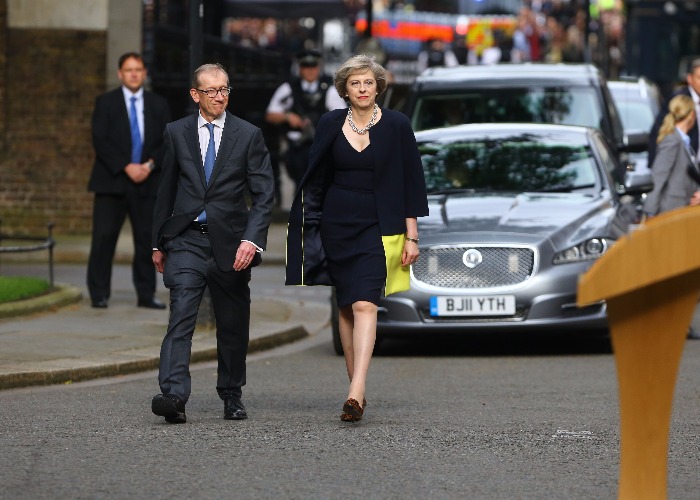Opinion: why Theresa May needs to invest more in Britain

Austerity must end. The answer to Britain’s problems is Government investment, writes Felicity Hannah.
Former home secretary Theresa May has entered Downing Street and become Prime Minister at a time of unprecedented peace-time crisis.
The pound is lower, the markets are skittish and the entire global economy is experiencing the shockwaves of a unique political event – the vote from the people of this country in favour of Brexit.
Already, May has wiped her predecessor’s slate, filling her cabinet with some unexpected and certainly different-thinking individuals.
One of the most interesting appointments was Philip Hammond to the role of chancellor.
He has already made comments that suggest he will scale back austerity, arguing that it is time to review the pace as the economy enters “a new phase”.
But I think we shouldn’t just scale back austerity; we need to actively spend if Britain is going to ride this financial storm.
I also believe that the former chancellor was actively harming the economy with his austerity programme.
Get investing for your own future: visit our investment centre
How George got it wrong
We all know that George Osborne declared there would need to be further austerity and tax hikes following the Brexit vote, but the new cabinet shouldn’t listen to him.
He’s been wrong in the past and I think he was wrong about what the country would need after the Brexit vote.
Back in February, the authoritative Organisation for Economic Cooperation and Development (OECD) warned that low interest rates and quantitative easing were not enough to boost growth, calling on richer countries to stop focusing on austerity and instead spend more on infrastructure.
Catherine Mann, the OECD’s chief economist, said pro-growth fiscal policies would reduce financial risks.
“With Governments in many countries currently able to borrow for long periods at very low interest rates, there is room for fiscal expansion to strengthen demand in a manner consistent with fiscal sustainability.”
Okay, that was then and this is now.
The Brexit result gave our economy one of the biggest peace-time shocks it has ever suffered, the results reverberated around the world and now another recession looks increasingly likely.
And if you look at Germany, with an economy we can only dream of, guess what they are doing in response to the Brexit vote?
They’re spending like it’s going out of fashion. German finance minister Wolfgang Schäuble has unveiled a budget where spending rises steadily every year between now and 2020.
In fact, Schäuble intends to increase spending by 10% over the next three and a half years, while also balancing the budget and bringing Germany’s debt-to-GDP level below 60%.
Admittedly that’s easier in a country with the largest economy in Europe and the fourth-largest in the world, but it shows that spending can strengthen a country and can be used to secure growth.
But also, the austerity may have been responsible in part for the decision to leave the EU.
This has been the weakest recovery in a century, we’ve seen entire industries collapse and the average worker is still worse off overall than they were before the recession – and that’s not even factoring in the closed SureStart centres, libraries and other frontline services we’ve all lost.
So it’s time for the UK to plan some emergency spending while interest rates are low and debt is affordable.
Our economy will grow, the sun will shine and then it’s time to fix the roof.
Here are some of the things he could choose to spend on, and why they would make an enormous difference for the UK.
1. Spend on infrastructure
You know what businesses need to grow? Good roads, good rail links and good facilities and confidence that their staff can find homes, use hospitals and get their children into adequate schools.
Such an investment would create jobs and encourage businesses to move into Britain or to expand here.
More cuts to infrastructure spending is likely to be the death knell for a great deal of British investment, particularly when the Brexit uncertainty is such as massive issue.
Investing in underfunded areas would also stem the anger felt by some at immigrants, who are often seen as using up scarce resources.
The actual truth is that EU immigrants contribute more in taxes overall than they take in benefits, contributing more than £20 billion to UK public finances between 2001 and 2011.
Perhaps if we had ring-fenced some of that contribution to help protect services and infrastructure in the areas that saw the most migration then people wouldn’t feel services were so squeezed.
That just seems a fair way to spend money, and one that would benefit the British people who feel that immigration has harmed their lives.
Also, you know where needs investment desperately, Ms May? The north. Which brings me onto the next big area of investment…
2. The Northern Powerhouse
A catchy title is not enough, the north desperately needs investment in its infrastructure and then work to drive business up from the south.
A strengthened infrastructure would play a large part in attracting businesses out of London and towards cheaper rents and lower salaries.
Perhaps we also need tax breaks to encourage movement out of London and into Cornwall, Wales, up into northern England and Scotland.
This would also help share the nation’s wealth more evenly. I live in the north and we look on in outraged surprise as our roads crumble and London plans a Garden Bridge.
We need spending on basics, we need spending on culture, we need our fair share of what little spending there is.
Instead, the north has suffered the effects of austerity disproportionately, with most of a £300 million transition funding ‘cushion’ predominantly going to Tory-led councils in the south.
Plan for your future: visit our investment centre

3. Housing
David Cameron proudly told parliament that 700,000 new homes had been built during his leadership but the sad truth is that simply hasn’t been enough.
We need 250,000 new homes every year simply to keep up with demand and the markets have not been delivering them.
Investing in house building rather than simply helping finance house purchase is the only way to fix this problem and would create jobs and provide stability for thousands of families.
4. Pick a London airport already
Forget pushing the button on Article 50, one of the most challenging decisions the new PM will have to take is whether to expand Heathrow Airport or Gatwick.
Heathrow is favourite among travellers and businesses, but increasing flights there risks annoying a vast amount of the millions of Londoners who live beneath the central London flight path to Heathrow.
But this is an issue that has been kicked into the long grass far too often and that’s costing the country business.
Heathrow is one of the world’s busiest airports but it’s working at 98% capacity and we risk losing out to Amsterdam and Paris if we don’t make a decision soon.
With the Brexit vote already making would-be investors nervous about Britain, the lack of an adequate airport – or even a plan! – could be yet another nail in the coffin for inward investment.
Stocks & Shares ISA, sharedealing accounts and more: loveMONEY investment centre
5. Renationalise the railway
Want to win over a large number of Labour supporters to the new Conservative Government?
Renationalising the railways could make political and financial sense.
Train services in this country are among the most expensive in Europe, forcing people into cars and discouraging businesses from moving out of the major cities.
The Government subsidises the nation’s railways to the tune of £4 billion a year, while the rail franchises make millions of pounds in profits.
We’d probably still pay those billions – our rolling stock, lines and stations all need upgrading – but there’s no reason for private companies to siphon off profits while the state subsidises the structure.
What do you think, should the state spend more? What would you prioritise if you were chancellor? Have your say using the comments below.
Read more on loveMONEY:
Comments
Be the first to comment
Do you want to comment on this article? You need to be signed in for this feature